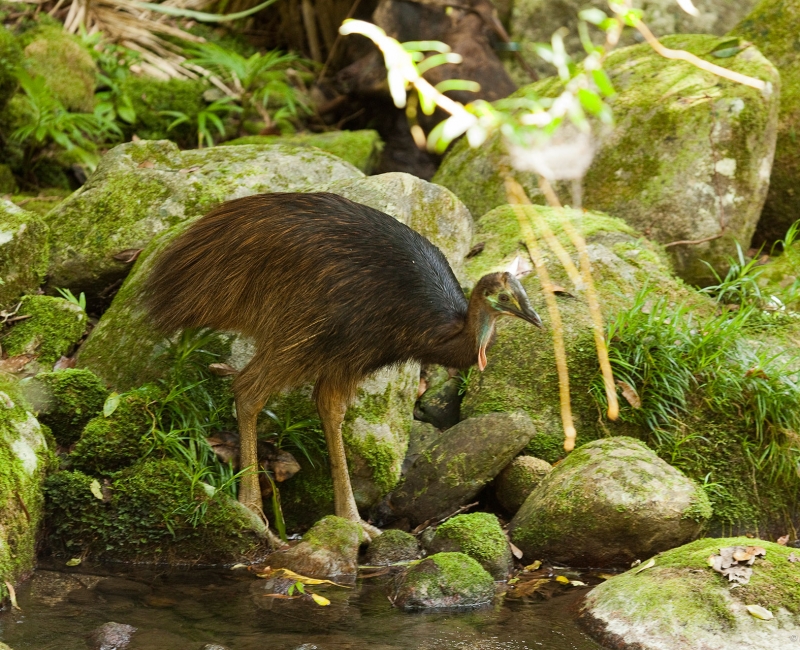Living with Cassowaries
Living with Cassowaries
The Southern Cassowary has held important physical, cultural, and spiritual significance for the Aboriginal peoples of Northern Queensland for many thousands of years. The Traditional Owners understood the role the cassowary played in maintaining the rainforest – which provided food, fresh water, shelter, and materials for arts and crafts, medicines, and herbs.
In the modern world, it’s easy to forget the role rainforests still play in supporting and regulating many of the planet’s most critical natural processes: rainfall, absorption of carbon dioxide, and combating climate change. These ‘eco-systems services’ are estimated to be worth trillions of dollars per year globally.
Today the Southern Cassowary faces serious threats from development and disease to natural disasters. The captive breeding program undertaken in zoos around the world is helping to maintain this magnificent creature for future generations, but we need to act now if we are to continue to see the cassowaries thrive in the wild.
Below are some tips that will come in handy if you find yourself living with cassowaries.
CASSOWARY ETIQUETTE
If you are lucky enough to live among cassowaries or are visiting areas where they live, please take the steps below to ensure your safety and the safety of these magnificent birds.
DO NOT FEED CASSOWARIES
Please DO NOT feed the cassowaries. Cassowaries need to be foraging for their own food in the rainforest and not waiting for a feed of chopped fruit (or other food that is not species-appropriate) in our urban areas.
Cassowaries can become used to hand-feeding, thus increasing their exposure to the risks posed in developed areas, such as vehicle strikes and dog attacks. Hand-feeding can also lead to confrontations between Cassowaries and humans. Following cyclones, the Queensland Parks & Wildlife Service organises feeding in a manner that is safe for both birds and people. If you’re living with cassowaries in your area or visiting Cassowary Country, please dispose of food rubbish safely and secure your compost bin to prevent ‘raids’ by cassowaries and other wildlife.
It is illegal to feed cassowaries (and other native wildlife in Queensland) without a permit. As of March 2021, the maximum penalty for deliberately feeding a cassowary is $5,222.
You can report deliberate cassowary feeding to the Department of Environment and Science (DES) on 1300 130 372 or via email to cassowary.sighting@ehp.qld.gov.au (include as much information about the circumstances as possible).
DRIVE CAREFULLY
Road accidents are the leading cause of cassowary mortality in Queensland. Drive safely in cassowary country and be alert for cassowary crossing signs and the birds themselves. Do not throw rubbish or feed cassowaries from your vehicle. Alert oncoming drivers to cassowaries on the road by flashing your headlights. Cassowaries are most active in the early morning and late afternoons but may be encountered at any time of day. Vehicles are the single biggest cause of cassowary mortality in some areas. When driving through cassowary habitat, particularly around Mission Beach, Bramston Beach, Coquette Point, Etty Bay, Paluma, and Cape Tribulation, please drive with care and BE CASS-O-WARY!
CONTROL YOUR DOGS
Dog attacks are responsible for many cassowary injuries and deaths, especially of juvenile birds and chicks. If you are living with cassowaries (or any wildlife), don’t let your dogs (or cats) roam free – keep them secured, especially at night.
If you’ve lost or found a dog, or encountered dogs that are not properly controlled, call your local council to report it.
- Cairns Regional Council: (07) 4044 3044
- Cassowary Coast Regional Council: (07) 4030 2222
- Cook Shire Council: (07) 4069 5444
- Charters Towers Regional Council: (07) 4761 5300
- Hinchinbrook Shire Council: (07) 4776 4600
- Lockhart River Aboriginal Shire Council: (07) 4060 7144
- Tablelands Regional Council: (07) 4043 4000
- Townsville City Council: (07) 4727 9000
- Wujal Wujal Aboriginal Shire Council: (07) 4083 9101
- Yarrabah Aboriginal Shire Council: (07) 4056 9120
AVOID CONFRONTATION
Treat cassowaries with respect. As is true with most wild animals, Cassowaries have been known to attack people when they have eggs or chicks to defend. Do not pick up cassowary chicks or approach family groups. If confronted, remain calm and back away slowly. Protect your front with a bag or backpack if possible, and shelter behind a tree. Do not run away as cassowaries can run faster than most people.
REPORTING SIGHTINGS
To report a non-urgent sighting (where immediate assistance is not required) please send sighting information i.e., when (date), where, what time, how many, and what they were doing to Jeff Larson of C4 (larsonjeff86@gmail.com).
You can also share information about sightings in the Mission Beach area via the Mission Beach Cassowaries group on Facebook or by filling in the sightings log at the C4 visitor centre. For more contacts at C4 click here.
The Daintree Region Cassowary Group would love information about sightings in the Daintree and Cape Tribulation area. Click on the “Submit Sighting” link on the front page of their website and complete the online form.
You can also submit sighting information to Kuranda Conservation Community Nursery.
If you see a cassowary in trouble and in urgent need of assistance such as an injured cassowary an orphaned chick, or a cassowary in clear distress (e.g. sick or starving), please call the 24-hour hotline 1300 130 372.
After hours, this number goes to the Northern Region Duty Officer at the Wildlife Management Unit. If your call goes to voicemail, please leave a message with as much detail as possible about the incident, location, timing, and contact details so that local rangers or wildlife carers are able to respond appropriately.
You can also call the hotline if you see a cassowary crossing the road and there is a need for temporary Cassowary Crossing signs to be erected. Choose the injured cassowary option.


DONATE NOW
When you give generously, you become part of a committed team of individuals who collectively are helping to preserve some of the most biodiverse habitats and the species that live within them on this planet. Become a Rainforest Rescuer today!


